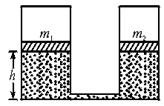问题
计算题
如图所示,两个可导热的气缸竖直放置,它们的底部由一细管连通(忽略细管的容积)。两气缸各有一活塞,质量分别为 和
和 ,活塞与气缸壁无摩擦。活塞的下方为理想气体,上方为真空。当气体处于平衡状态时,两活塞位于同一高度h。(已知
,活塞与气缸壁无摩擦。活塞的下方为理想气体,上方为真空。当气体处于平衡状态时,两活塞位于同一高度h。(已知 =3m,
=3m, =2m)
=2m)

(1)在两活塞上同时各放一质量为m的物块,求气体再次达到平衡后两活塞的高度差(假定环境的温度始终保持为 )。
)。
(2)在达到上一问的终态后,环境温度由 缓慢上升到T,试问在这个过程中,气体对活塞做了多少功?气体是吸收还是放出了热量?(假定在气体状态变化过程中,两物块均不会碰到气缸顶部)
缓慢上升到T,试问在这个过程中,气体对活塞做了多少功?气体是吸收还是放出了热量?(假定在气体状态变化过程中,两物块均不会碰到气缸顶部)
答案
⑴两活塞的高度差为
⑵
在此过程中气体吸收热量
⑴设左、右活塞的面积分别为A/和A,由于气体处于平衡状态,故两活塞对气体的压强相等,即: 
由此得: 
在两个活塞上各加一质量为m的物块后,右活塞降至气缸底部,所有气体都在左气缸中。
在初态,气体的压强为 ,体积为
,体积为 ;在末态,气体压强为
;在末态,气体压强为 ,体积为
,体积为 (x为左活塞的高度)。由玻意耳-马略特定律得:
(x为左活塞的高度)。由玻意耳-马略特定律得:

解得: 即两活塞的高度差为
即两活塞的高度差为
⑵当温度由T0上升至T时,气体的压强始终为 ,设x/是温度达到T时左活塞的高度,由盖·吕萨克定律得:
,设x/是温度达到T时左活塞的高度,由盖·吕萨克定律得: 
活塞对气体做的功为:
在此过程中气体吸收热量
